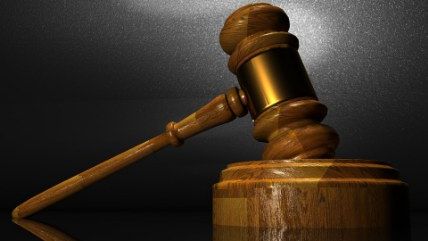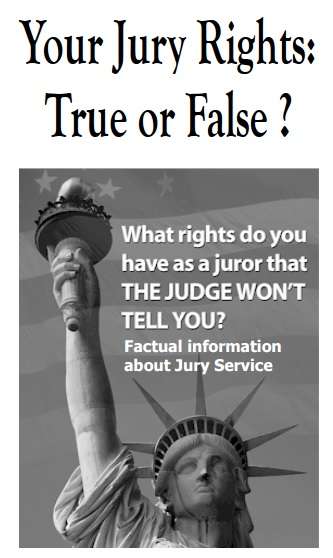Jurors Convict Man for Telling Jurors About Jury Nullification
Handing out pamphlets gets treated as a crime.


Jurors in Mecosta County, Michigan, have convicted a man for telling potential jurors that they don't have to convict people.
In 2015, Keith Wood stood outside a district courthouse in Big Rapids handing out pamphlets to passers-by. The literature explained the concept of jury nullification—the idea that jurors have the right to refuse to convict people of breaking laws they believe are unjust. Wood and his lawyer contend that distributing these pamphlets is protected free speech.
Prosecutors disagreed. Wood was convicted Thursday of attempting to influence a jury, a misdemeanor charge that could lead to a sentence of up to a year in jail.
The court was selecting only one jury that day, for the trial of an Amish man charged with draining wetlands on his property. And that man decided to plead guilty, so no jury was seated anyway. But prosecutors argued that the very nature of such fliers taints a jury pool. As Mecosta County Assistant Prosecutor Nathan Hull told the jury, "This pamphlet from beginning to end is designed to benefit a criminal defendant."
Let that argument soak in for just a moment. Here's the kind of information that Hull worries will "benefit" the people he's trying to prosecute:
Did judges fully inform jurors of their rights in the past?
Yes, it was normal procedure in the early days of our nation, and in colonial times. And if the judge didn't tell them, the defense attorney often would. America's founders realized that trials by juries of ordinary citizens, fully informed of their powers as jurors, would confine the government to its proper role as the servant, not the master, of the people.
Our third president, Thomas Jefferson, put it like this: "I consider trial by jury as the only anchor yet imagined by man by which a government can be held to the principles of its constitution."
John Adams, our second president had this to say about the juror: "It is not only his right, but his duty…to find the verdict according to his own best understanding, judgment, and conscience, though in direct opposition to the direction of the court."
Sadly, the jury took less than an hour of deliberation to convict Wood. But perhaps we shouldn't be surprised. The judge apparently prevented Wood's lawyer from offering any sort of First Amendment–based defenses. Because of the judge's behavior, Wood's jury received only limited information—a practice, interestingly enough, that the nullification pamphlet warns about. If only somebody been handing them out when they were seating Wood's jury. Wood's lawyer says they'll appeal the verdict.
Bonus link: For more from Reason on this case, go here. And go here to read about the time I got called in for jury duty and was put in the awkward position of correcting a judge's assumption that I would enforce the law regardless of whether I agreed with it. Guess who was the first person dismissed from the jury pool?


Show Comments (113)